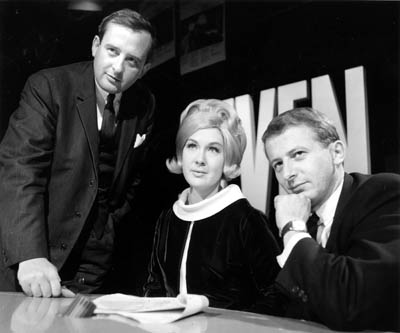At 10 pm on Sunday, October 4, 1964, the Canadian Broadcasting Corporation introduced its innovative public affairs program, This Hour Has Seven Days. By year's end, the show was attracting 2 million watchers. Fifty shows later, when the CBC killed Seven Days, it had an audience of 3.3 million, more viewers than any Canadian television program except Hockey Night in Canada. Seven Days was a genuine phenomenon.
In the first program, executive producers Patrick Watson and Douglas Leiterman led a dizzying parade of people and events. Into sixty minutes they squeezed Ottawa scandal searching, a Quebec airplane crash, American civil rights, a silly British law lord, the Beatles, Harpo Marx, Chicago's Second City comedy troupe and William Shakespeare. Topping it off, the mother of presidential assassin Lee Harvey Oswald was imported to proclaim her son's innocence.
At a quick glance, it seemed nothing too surprising. One reviewer likened the first edition of Seven Days to the Ed Sullivan Show, the top variety program of the day - simply one abrupt entertainment hard on the heels of another.

|
| An early taping of "This Hour Has 7 Days. Laurier LaPierre, Carole Simpson and Patrick Watson (courtesy CBC Still Images). |
Below the surface, though, Seven Days was subversive. Part way through the first show, Watson and Leiterman promised "vigorously produced public affairs material" which would probe "dishonesty and hypocrisy, drawing attention to public wrongs and encouraging remedial action." Tough encounters would be included with "prominent guests hot in the news and prepared to be grilled."
The program, writes its historian, Eric Koch, "presented itself as one of the few public institutions on the people's side and suggested subliminally that there was no need any longer to look up to the guardians of authority with respect." Seven Days "was the people's show. It was exciting, revealing, cocky, fearless, accusatory, emotional, titillating."
The tone was one of skepticism and impertinence, married to a bruising style popularized in the United States by Mike Wallace, whose controversial interview techniques featured direct confrontations and harsh close-ups against the background of a utilitarian set and rising cigarette smoke. It was pre-pretty boy public affairs television, all grit and edge.
Seven Days pleased the CBC briefly. The program was aimed at and popular with all segments of society, good news for a network often accused of elitism. It was also palpably homegrown, more than able to hold its own against the increasing Americanization of Canadian television.
But CBC headquarters in Ottawa had an unshakeable point of view on controversial public affairs matters, which was that the network had no point of view. Seven Days brazenly broke the neutrality rule. The pattern was set in the second show, when moderator Laurier LaPierre (chosen over another aspirant, Pierre Trudeau) questioned whether Queen Elizabeth ought to have been invited to tour Quebec. Could she still realistically be a symbol of Canadian unity?
The tussles between CBC Ottawa and the Seven Days staff became a weekly spectacle as the program put politicians in the hot seat, skewered Washington over Vietnam, satirized the Queen and the Pope, and shed a tear for Steven Truscott, who had been convicted of a teenage murder on thin evidence.
As the program careened into its second season, the general manager of English Network Broadcasting urged that Seven Days be cancelled. Could the CBC, he asked, "go on any longer with this program and its arrogance; its determination for absolute journalistic (yellow?) freedom; its preoccupation with sensationalism; and, yes, its large audience?"
The program lurched ahead nevertheless, but the differences between the palace guard and the young infidels were irreconcilable. "Certainly we could have been more judicious and less provocative and still done what we wanted to do," Watson (who co-hosted with LaPierre in the second year) admitted years later, but "that never occurred to us."
In the spring of 1966, Watson and LaPierre were given notice that their contracts would not be renewed. The program lived a little while longer, but not into a third season.
The first showing of Seven Days forty years ago saw the future. It anticipated the later 1960s, when every one of western society's values and beliefs was put under the microscope. It was a forerunner of the television programming that was soon to come, with its rapid fire movement and short span of attention, its mix of celebrity and journalism, and its belief that nothing, absolutely nothing, is sacred.

 Share on Facebook
Share on Facebook Share on X
Share on X Share by Email
Share by Email Share on Google Classroom
Share on Google Classroom